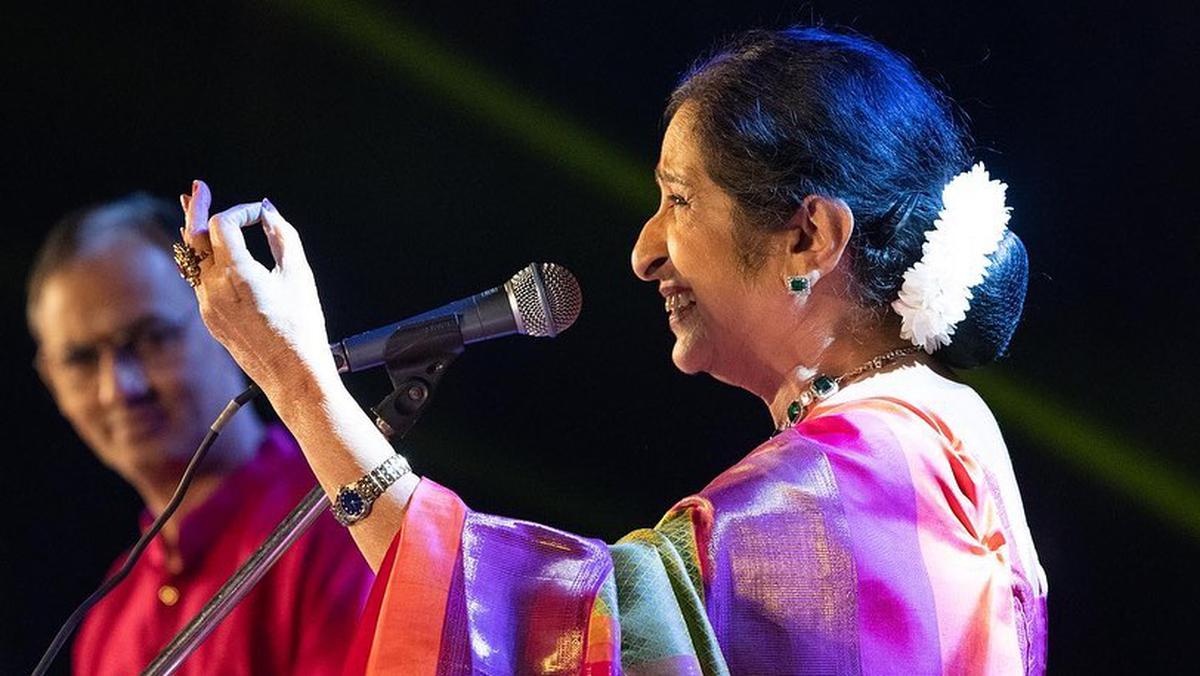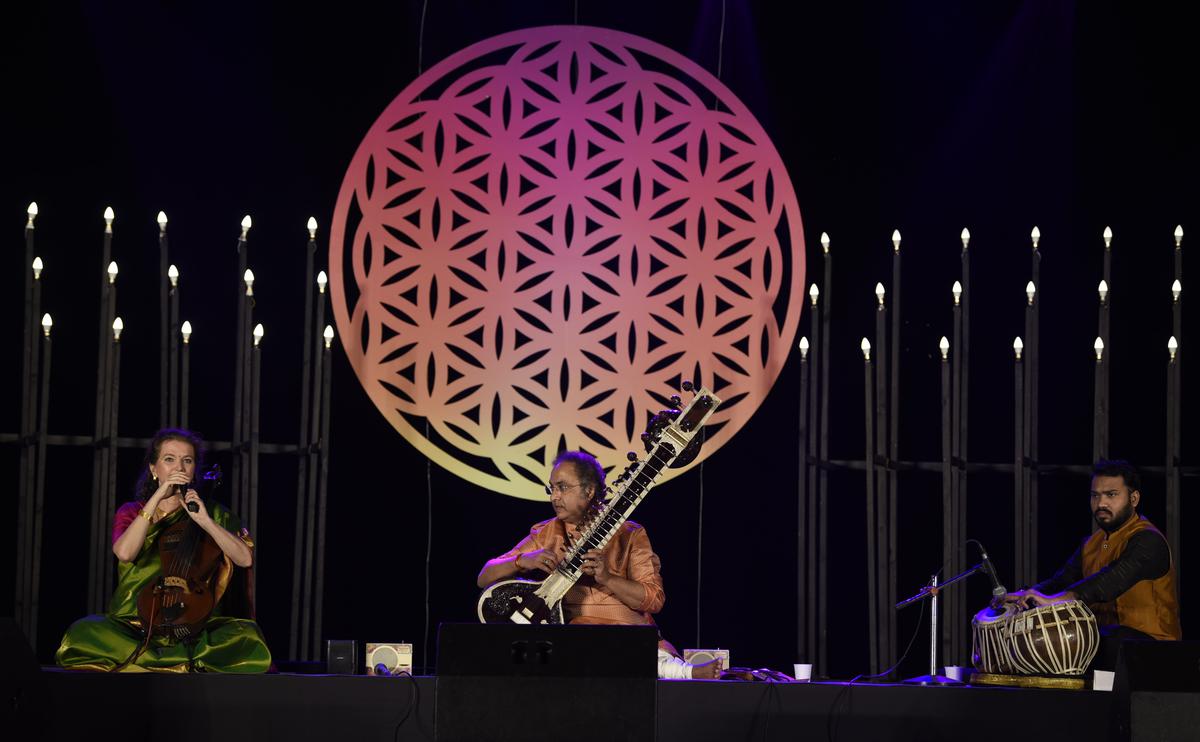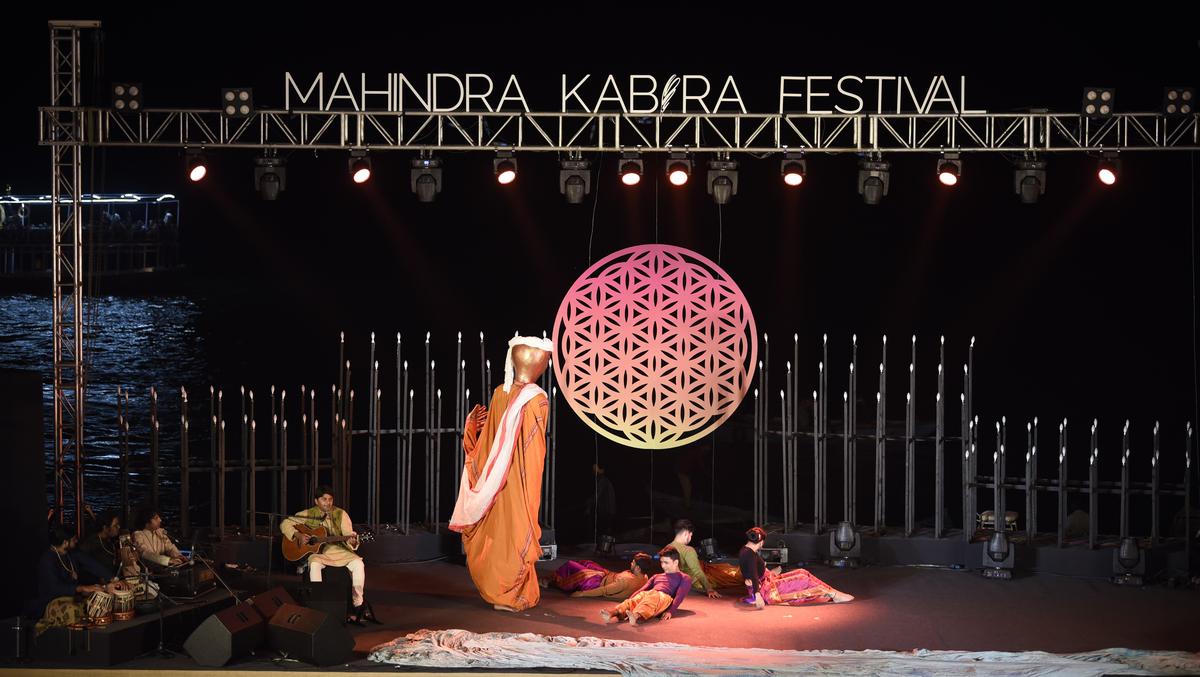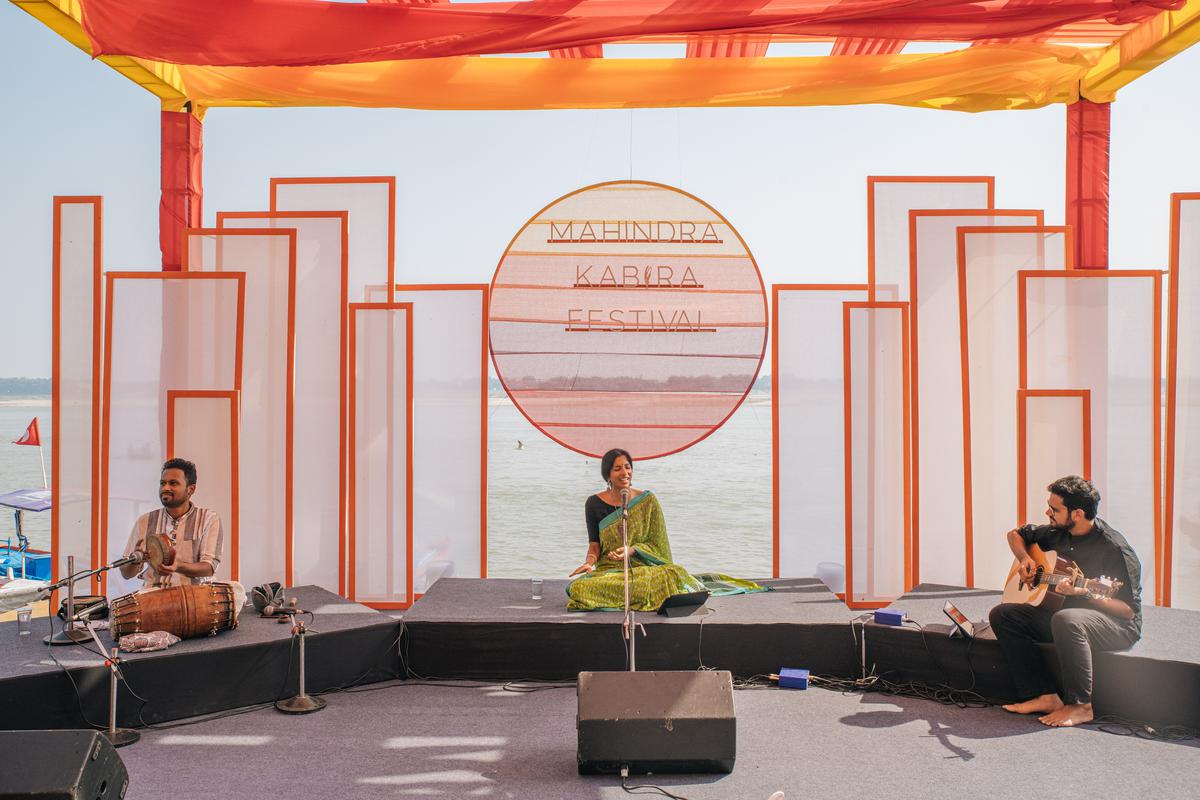Soothing notes of the morning raag Bairagi serenaded the misty dawn. The rays of the Sun shimmered on the languidly flowing Ganga. As virtuoso Kamala Shankar played a dhun on the Shankar guitar (classical slide guitar), boats glided past the picturesque Guleria Ghat, clouds of seagulls rose into the air while hundreds of pilgrims performed morning oblations on the river banks. Music merged with the light, the breeze and the river to celebrate the life and teachings of Kabir, the 15th century mystic poet-saint.

Aruna Sairam at the sixth edition of the Mahindra Kabira Festival in Varanasi.
| Photo Credit:
The Hindu
At the sixth edition of the Mahindra Kabira Festival, music, literature, philosophy, art, theatre and story-telling segued into a seamless homage to Kabir, who lived in Varanasi. ‘Kabir in every sense’, the tagline of the festival, united aesthetics of different art forms, which has become the identity of the festival.
Hindustani and Carnatic musicians such as Aruna Sairam and Vikash Maharaj, new-age musicians Raghu Dixit and Jasleen Aulak, philosophers and academics explored Kabir, sans barriers of age and region.
Universal appeal
“The Mahindra Kabira Festival is a great platform to celebrate our diversity, and how Kabir’s teachings ring true for all of us through different musical forms. To create and perform music that has an universal appeal, to share and spread the words of wisdom written and spoken by great poets and philosophers, is every artiste’s dream,” says Aruna.

Anahat: a symphonic poem by Pandit Shubendra Rao and Saskia Rao de-Haas as part of the sixth edition of the Mahindra Kabira Festival
| Photo Credit:
SPECIAL ARRANGEMENT
Dwelling on the overwhelming response to the Festival, academic Umesh Kabir, who is part of the Kabir math, asserts that Kabir’s teachings are relevant for all times. “What is not to love when he talks about removing filters to keep the mind free of prejudice and religious bigotry, to celebrate oneness, to introspect instead of criticising others? How can he not be relevant when he talks about religious bigotry? Kabir was a staunch opponent of superstition and dogmatic orthodoxy. His self-deprecating humour highlighted social evils. An iconoclast, he was not afraid to question anything,” says Umesh.
It is the syncretic philosophy of Kabir, couched in lyrical verse, which continues to resonate in people from all walks of life even today. For Bengaluru-based musician Sandeep Pillai, the lead singer of Soule Band, it was Kabir’s love for mankind and his thoughts on inclusivity and looking within oneself for peace that attracted him. “It was in tune with what I was searching for. When renowned puppeteer Dadi D Padumjee, founder of Ishara Puppet Theatre, wanted me to compose and perform live for the show with my band, I felt it was serendipity,” he says.

A scene from Dohe Jo Mohe, a puppet show presented by Ishara Puppet Theatre and Soule Band in connection with the sixth edition of the Mahindra Kabira Festival held in Varanasi
| Photo Credit:
SPECIAL ARRANGEMENT
Dadi, who presented a puppet show ‘Dohe Jo Mohe’, echoes Sandeep’s sentiments. Kabir’s famous ‘Chadariya jheeni re jhini’, played by Soule to accompany Ishara’s moving performance had the audience on their feet.
Kabir’s life and iconic imagery have found a place in visual arts as well.

Sushama Soma in performance at Guleria Ghat in connection with the sixth edition of the Mahindra Kabira Festival held in Varanasi.
| Photo Credit:
SPECIAL ARRANGEMENT
Significant motifs in Kabir’s tenets such as the pot, spinning wheel, sheet and more were highlighted in a conversation between Roobina Karode, director and chief curator of Kiran Nadar Museum of Art, and Anubhav Nath, director of Ojas Art. Roobina points out that although several artistes such as K.G. Subramanian and Arpana Caur have drawn inspiration from Kabir, it was the late artist Faku Shah, who interpreted the saint’s teachings in his minimalistic works along with his hand-written notes of Kabir’s Dohe. She says the relevance of Kabir is easy to understand if one looks at the values he espoused, especially at a time of unbridled consumerism and stress-filled lives. Anubhav says the Mahindra Kabira Festival “has grown in a very organic way and should be attended by thoseinterested in Kabir, music and Varanasi. It is truly an amalgamation of all three aspects….”
The synergy of Kabir
The Festival began on November 18 with a santoor-tabla jugalbandhi by Kumar Sarang and Pandi Lalit Kumar.
On November 19, the day unfolded with a concert by Kamala Shankar on the Shankar guitar, followed by a majestic Dhrupad Kabir by Ashish Kumar Jaiswal. Umesh Kabir’s talk, which followed, was on ‘Suno Bhai Sadho’.
The afternoon session began with a conversation between Roobina Karode and Anubhav Nath on ‘Imagining Kabir: Representation in visual art’. Sushma Soma presented songs from her album ‘Home’ and a couple of compositions from an album that is to be released soon.
In the evening at Shivala Ghat, a choir by students of Little Flowers House School preceded a puppet show Dohe jo Mohe by Ishara Puppet Theatre and Soule Band. Anahat: a symphonic poem by Pandit Shubendra Rao and Saskia Rao de-Haas came next. The evening concluded with a concert by Aruna Sairam.
Rama Sundar Ranganathan began the second day’s programme with a concert on ‘The Colour of Bhakti’ followed by a soulful concert by Pandit Pandit Vikash Maharaj’s, ‘Untouched music of Banaras’. In the afternoon Fouzia Dastango and Ritesh Yadav presented Dastan-e-Kabir, written by Danish Iqbal. Purushottam Agarwal and Vipin Heero talked on ‘Kabir Panguda Allah Ram Ka’.
In the evening, a choir by students of WH Smith preceded concerts by the The Tapi project, Jasleen Aulakh, and The Raghu Dixit Project.
The impact of Kabir’s verses
Every artist has his or her reason to explain why Kabir’s life and teaching are relevant. Hindustani vocalist Rama Sundar Ranganathan of the Indore gharana, says ideals of equality, dignity and introspection attracted her to the Bhakti saints and particularly to Kabir. “We need to popularise their philosophy of love towards all and bring those eternal truths closer to the people. Many of them were not afraid to question societal and religious norms of the time and their reasoning was way ahead of their times,” she says.
Raghu Dixit’s rocking concert on the last day of the sixth edition of the Mahindra Kabira Festival held in Varanasi.
| Photo Credit:
SPECIAL ARRANGEMENT
Three evenings of magical melodic experiences concluded with performances by The Tapi project, comprising Yogendra Saniyawala, Swati Minaxi, Biju Nambiar and Gaurav Kapadia; singer-songwriter Jasleen Aulakh, and The Raghu Dixit Project.
Admitting that she was lucky to have been able to present Kabir’s verses at his birthplace, Jasleen says that Kabir’s dohas impacted her deeply during her growing-up years, and in due course influenced her music.
Raghu Dixit’s concert brought the curtain down on this well-curated festival. Dixit says that the Festival has helped him explore the works of Kabir. Presenting the ideas of Saint Sheshnath and Kabir together in a single song, Raghu says he plans to go back to the studio to record his new composition.
A choir by students of Little Flowers House School Glimpses was a part of the sixth edition of the Mahindra Kabira Festival held in Varanasi
| Photo Credit:
SPECIAL ARRANGEMENT
Vice president, and head — Cultural Outreach, Mahindra & Mahindra Ltd, Jay Shah says, “As the sun sets on this ear’s Mahindra Kabira Festival, our hearts are full with the warmth of the people of Varanasi, the artistes and the audiences.”





